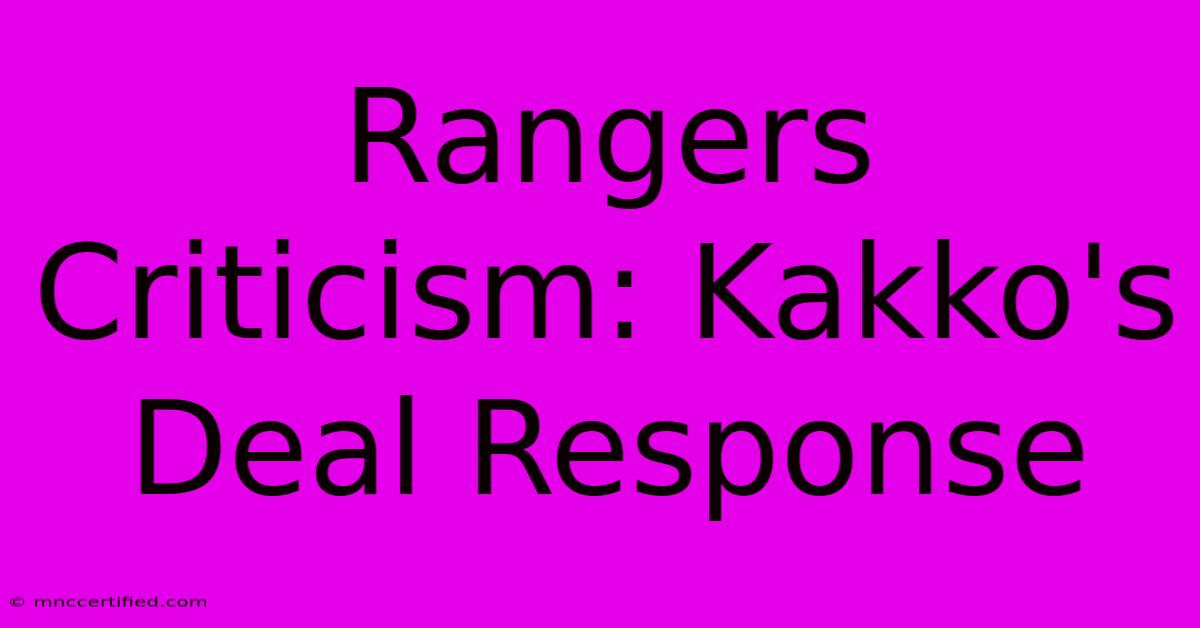Rangers Criticism: Kakko's Deal Response

Table of Contents
Rangers Criticism: Kakko's Deal, A Measured Response?
The New York Rangers' recent contract extension with Kaapo Kakko has sparked a wave of debate among fans and analysts. While some hail it as a shrewd move, others criticize the deal, questioning its value and long-term implications. This article delves into the criticism surrounding Kakko's contract, examining both sides of the argument and exploring the potential ramifications for the Rangers.
The Deal Itself: A Closer Look
Kakko's eight-year, $47.2 million contract extension, averaging $5.9 million annually, represents a significant investment by the Rangers. This figure places him among the team's higher-paid players, raising concerns about his consistency and overall production relative to his salary. The deal's length also raises questions, especially given Kakko's somewhat erratic performance throughout his NHL career.
What the Critics Say
The most prominent criticism revolves around Kakko's perceived inconsistency. While he's shown flashes of brilliance, scoring crucial goals in the playoffs and demonstrating a strong physical presence, his overall production hasn't consistently matched the expectations placed upon a top-ten draft pick. Critics point to his fluctuating point totals and occasional struggles with offensive consistency as reasons for concern. Some argue that the Rangers could have secured similar production at a lower cost by investing in other players or focusing on strengthening other areas of the team.
Another aspect of the criticism centers around the length of the contract. Eight years is a long commitment, particularly for a player who hasn't yet proven himself to be a consistent top-line performer. The risk of the contract becoming an albatross around the Rangers' neck increases with each passing season if Kakko fails to live up to expectations. The cap hit becomes particularly relevant considering the Rangers' other salary commitments and the need to retain other key players in the near future.
A Defense of the Kakko Deal
However, it's crucial to present a balanced perspective. Defenders of the contract emphasize several key points. Firstly, they highlight Kakko's potential. He is still young, and his performance in the 2023 playoffs showcased his ability to rise to the occasion under pressure. His playoff performance was instrumental, demonstrating his capability of stepping up when it matters most. This suggests a potential for significant growth and increased production in the coming years.
Furthermore, the contract's average annual value (AAV) isn't exorbitant compared to other players of similar age and potential within the league. Considering the rising salary cap and the ever-increasing cost of acquiring and retaining top talent in the NHL, the deal could be seen as a reasonable investment in a player with a high ceiling.
The team's belief in his development and the potential for future growth is also a factor to consider. The Rangers' management clearly sees something special in Kakko, and their willingness to commit to him long-term speaks volumes about their faith in his ability to develop into a key component of their team.
Long-Term Implications
The long-term implications of Kakko's contract will largely depend on his performance. If he can consistently deliver on the potential he's shown in flashes, the deal will be seen as a success. However, if his production remains inconsistent, it could hinder the Rangers' ability to build a truly competitive roster, especially when considering future contract negotiations for other key players.
The success of the deal hinges not only on Kakko's individual performance but also on the overall performance of the Rangers. If the team performs well overall, the cost of Kakko's contract may be viewed as a necessary investment. Conversely, if the team struggles, it could be perceived as a significant misallocation of resources.
Conclusion: A Risky but Potentially Rewarding Bet
The criticism surrounding Kaapo Kakko's contract extension is understandable, given his inconsistent past performance. However, the deal also represents a calculated risk, a bet on Kakko's potential and the belief in his ability to develop into a key player for the New York Rangers. Only time will tell if this bet pays off. The coming seasons will be crucial in determining whether this deal is a shrewd move or a costly mistake for the Rangers.

Thank you for visiting our website wich cover about Rangers Criticism: Kakko's Deal Response. We hope the information provided has been useful to you. Feel free to contact us if you have any questions or need further assistance. See you next time and dont miss to bookmark.
Featured Posts
-
Gisele Pelicot 20 Year Jail Sentence
Dec 20, 2024
-
Donnarumma Injury Update Psg Stars Status
Dec 20, 2024
-
Towns Returns Knicks Gain Momentum
Dec 20, 2024
-
Broncos Thursday Night Game Preview
Dec 20, 2024
-
No Trade Clause Blocks Arenado Deal
Dec 20, 2024